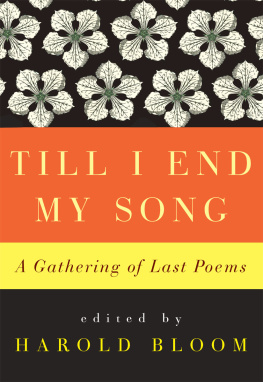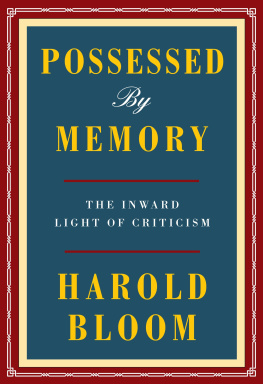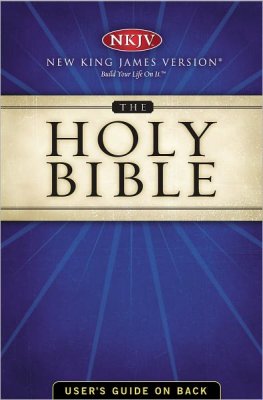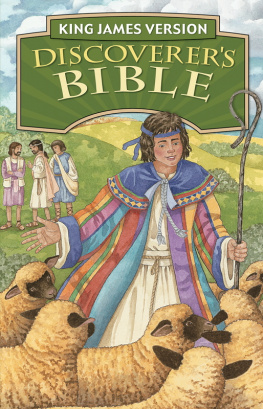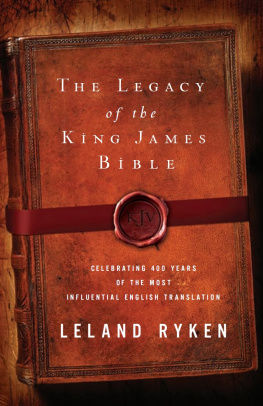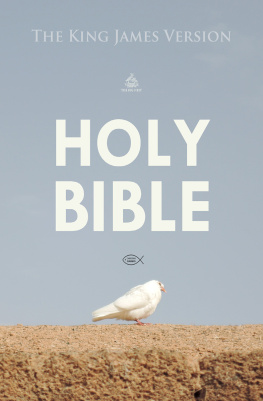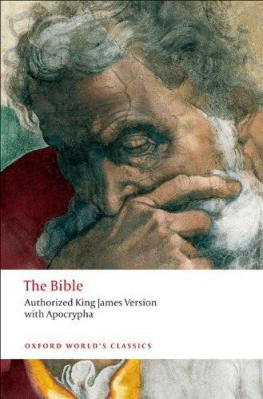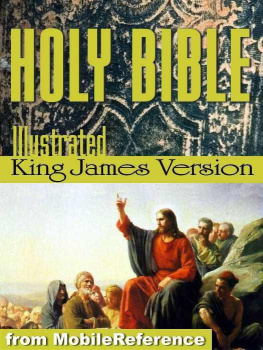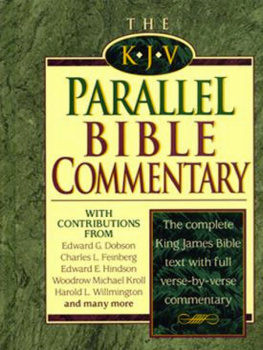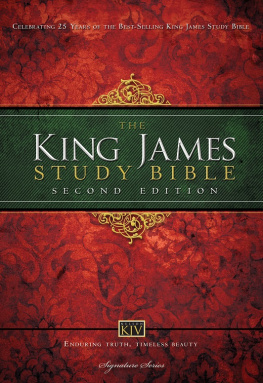THE SHADOW OF A GREAT ROCK
The Shadow of a Great Rock
A LITERARY APPRECIATION OF THE KING JAMES BIBLE

Harold Bloom

Published with assistance from the foundation established in memory of
Philip Hamilton McMillan of the Class of 1894, Yale College.
Copyright 2011 by Harold Bloom.
All rights reserved.
This book may not be reproduced, in whole or in part, including illustrations, in any form (beyond that copying permitted by Sections 107 and 108 of the U.S. Copyright Law and except by reviewers for the public press), without written permission from the publishers.
Boaz Asleep, from Selected Poems of Victor Hugo: A Bilingual Edition, trans. E. H. and A. M. Blackmore (Chicago: University of Chicago Press, 2001). Copyright 2001 by The University of Chicago.
The Dark Night, from The Poems of St. John of the Cross, trans. John Frederick Nims, 3rd ed. (Chicago: University of Chicago Press, 1989). Copyright 1959, 1968, 1979 by John Frederick Nims.
Peter Quince at the Clavier, from The Collected Poems of Wallace Stevens, by Wallace Stevens. Copyright 1954 by Wallace Stevens and renewed 1982 by Holly Stevens. Used by permission of Alfred A. Knopf, a division of Random House, Inc., and Faber and Faber Ltd.
Yale University Press books may be purchased in quantity for educational, business, or promotional use. For information, please e-mail sales.press@yale.edu (U.S. office) or sales@yaleup.co.uk (U.K. office).
Designed by Sonia Shannon.
Set in Stempel Schneidler type by Duke & Company, Devon, Pennsylvania.
Printed in the United States of America.
Library of Congress Cataloging-in-Publication Data
Bloom, Harold.
The Shadow of a Great Rock : a literary appreciation of the King James Bible/
Harold Bloom.
p. cm.
Includes index.
ISBN 978-0-300-16683-5 (alk. paper)
1. Bible. EnglishVersionsAuthorized. I. Title.
BS186.B56 2011
220.5203dc22 2011003148
A catalogue record for this book is available from the British Library.
This paper meets the requirements of ANSI/NISO Z39.481992 (Permanence of Paper).
10 9 8 7 6 5 4 3 2 1
To Leslie Brisman
And a man shall be as an hiding place from the wind, and a covert from the tempest; as rivers of water in a dry place, as the shadow of a great rock in a weary land.
Isaiah 32:2
Introduction
The Bible as Literature

THE TWO CENTRAL MASTERWORKS of English literature emerged together in the years 160411: the Authorized Version, or King James Bible (KJB), and the plays of Shakespeares major phase, from Measure for Measure and Othello through King Lear, Macbeth, and Antony and Cleopatra on to The Winters Tale and The Tempest. The King James Bible was completed in 1611, the same year that The Tempest was performed, the last drama Shakespeare composed by himself. (King James I had commissioned his Authorized Version in 1604, the year of Othello.) Four centuries later the sublime summit of literature in English still is shared by Shakespeare and the King James Bible. Shakespeare died in 1616; seven years later the First Folio appeared. From then until now, Shakespeare has become for many a single work, even as the King James Bible has been a single, comprehensive text for its common readers.
No one except scattered Bardolators like myself believes that Shakespeare is the Word of God, though there are millions who believe, in some sense, the King James Bible to be divine. I was raised to trust in Tanakh, the Hebrew Bible, but I find it impossible to trust Yahweh, and except on a purely aesthetic basis cannot learn to love Tanakh more than Yahweh. Shakespeare seems preferable to the Bible since he does not moralize, yet aesthetically the English Bible and Shakespeare divide the homage of the best readers of the language.
Shakespeare was influenced by the Geneva Bible, one of the KJBs direct ancestors, but rather in the way he responded to Ovid or to Chaucer. It is an oddity of literary history that the Geneva Bible was Miltons preference also, but he was accustomed to reading the Scriptures in Hebrew and Greek, though certain elements in his style and diction perhaps can be traced to the KJB.
With the 1660 Stuart Restoration, the KJB finally displaced the Geneva and achieved an ascendancy that continued until the late twentieth century and remains dominant in the United States today. Cormac McCarthys one great novel, Blood Meridian, may be a last stand of the KJBs literary influence. Even when echoing Melville and Faulkner, McCarthy tracks passages heightened by allusions to the KJB.
And yet the King James Bible is itself a composite work, weaving together an allusive web out of previous translations: not only that of the greatest English translator, William Tyndale, but those of Miles Coverdale and the group that produced the GenevaWilliam Whittingham, William Cole, Thomas Sampson, Christopher Goodman, and the Hebraist Anthony Gilbywere absorbed and transmuted by the more than fifty King James translators, of whom the chairmen (or directors) of six companies or committees were Lancelot Andrewes, Edward Lively, John Harding, John Duport, Thomas Raxis, and William Barlow. Among the others I would single out the eloquent Puritan Miles Smith, whose beautiful preface to the KJB is unfortunately omitted from nearly every current edition I have seen.
The inexplicable wonder is that a rather undistinguished group of writers (except for Lancelot Andrewes and Miles Smith) brought forth a magnificence almost to rival Shakespeares. Without Tyndale as fountainhead, it could not have been done, but Tyndales powerfully rugged prose is very unlike the orchestration of the sentences of the KJB. The language of the Authorized Version is even more metaphorical than that of its precursors, though this can be puzzling because its diction is so economical. Shakespeares vocabulary remains extraordinary in the history of imaginative literature: more than twenty-one thousand words, eighteen hundred of which he coined. Racine, grandest of French tragic dramatists, confines himself to just two thousand. The KJB keeps to eight thousand, a figure that surprises me because I would have guessed many more.
The richness of Shakespeares language gives very different effects from that of the KJB. At once opulent and elliptical, Shakespeares cognitive music is unique in literature. You cannot speak of Shakespeares styles as integral: they are friends of departure. Nor will the incomparable poet-dramatist deign to any mere consistency in his many voices and voicings. At his strongest he individualizes minor characters like Barnardine in Measure for Measure and the fig-seller in Antony and Cleopatra.
The translators of the English Bible, from Tyndale to Andrewes, were not dramatists, though Tyndale came closest. They do not voice their characters: Jacob and David do not sound different to us. That is a loss from the Hebrew. Beneath the hum of the redactors I hear in the Tanakh an original voice that both links and distinguishes Jacob and David. A great ironist (perhaps even two) precedes and plays against the pious tonalities of the redactors. Yahweh, in his relation to Jacob and to David, is a personality and not an anthropomorphic entity. They are theomorphic, but since the god is an outrageous fellow, well then so are they. That is why they matter, humanly and aesthetically, across the millennia.
Next page

